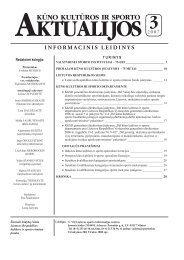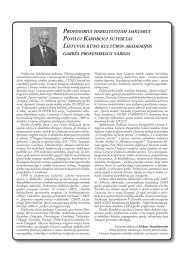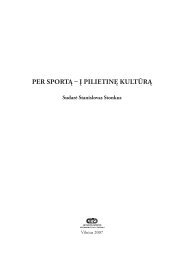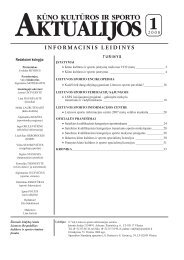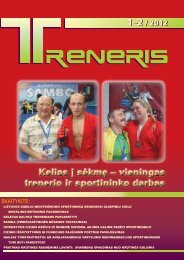Nr. 1 - Lietuvos sporto informacijos centras
Nr. 1 - Lietuvos sporto informacijos centras
Nr. 1 - Lietuvos sporto informacijos centras
You also want an ePaper? Increase the reach of your titles
YUMPU automatically turns print PDFs into web optimized ePapers that Google loves.
2010 <strong>Nr</strong>. 1(59)<br />
29<br />
with gaining access to the competition, forging<br />
inventory, taking forbidden medications. In this<br />
way he distinguishes two categories of deception in<br />
sport: deception during the contest and deception<br />
not during the contest. Deception during the contest<br />
is associated with unexpected competitive actions<br />
which violate the main rules regulating athletes’<br />
actions during the contest, and in this way cheating<br />
helps them to create favourable conditions for one or<br />
another side aiming to benefit from the situation and<br />
achieve advantageous results, usually victory. For<br />
example, a goal in football is sometimes scored by<br />
hand. One memorable event occurred in the Football<br />
World Championship in 1986. Straining towards the<br />
goal of the English team Diego Maradona threw the<br />
ball over the goalkeeper Peter Shilton and made a<br />
goal. The referee scored it up. In this championship<br />
the national team of Argentina won the title of World<br />
champions. This incident evoked lots of discussions<br />
among football specialists and fans. It should be<br />
noted that not only athletes, but also referees and<br />
contest organizers can cheat during a sports contest<br />
because the course of the contest depends on them<br />
much. According to D. Rosenberg (1995), deception<br />
not during the contest is closely (but not always)<br />
linked to deception during the contest. In some<br />
sports it is practically impossible to cheat during<br />
the competition (for example, in sprint). Usually<br />
deception is impossible in those sports where the<br />
mastery level of each athlete is compared, and athletes<br />
have no possibilities for cheating. Time, space and<br />
judicial conditions together with indirect relations<br />
with competitors limit the opportunities for deception<br />
which depend on the mastery level of the athlete.<br />
Deception in those cases usually occurs before the<br />
contest and after it. In general, deception not during<br />
the contest is possible in all sports. It must be noted<br />
that this kind of deception is being prepared to and<br />
planned beforehand and deliberately.<br />
Deception is characterized by one more feature –<br />
its secrecy (Fraleigh, 1988). It means that the one<br />
who is cheating wants to remain unnoticed and to<br />
show that nothing has happened. Cheaters usually<br />
want the contest to continue because otherwise their<br />
cheating would be senseless. Cheating can be open<br />
as well (Rosenberg, 1995). For example, the case<br />
of unsportsmanlike conduct penalty for the rough<br />
violation of rules. However, those actions are not<br />
common and they are not tolerated by the sports<br />
community. So many athletes try to cheat secretly and<br />
not cause any suspicion of breaking the system of the<br />
sports contest, i.e. they want to remain unobserved<br />
and protected by the system itself.<br />
It should be noted that sport is treated in the<br />
sense of its regulations and obstacles created by the<br />
same regulations. Besides, artificial obstacles can<br />
be perceived only in the connection of regulations.<br />
Regulations define what actions are allowed during a<br />
sports contest and who a winner is. But the formalistic<br />
outlook (where deception is associated with breaking<br />
the rules) helps neither defining what deception is<br />
nor solving other problems of sports ethics. For<br />
example, from a formalistic standpoint (if we perceive<br />
deception as breaking the rules) a cheater cannot<br />
win as he/she simply breaks the rules and does not<br />
perform actions necessary for this sport or game. In<br />
this way he/she does not play the game and cannot<br />
win. Unfortunately, the situation in sport is much<br />
more complicated. Sometimes athletes’ actions may<br />
not be fair though the rules are not broken, and in<br />
some situations there are no rules at all. The rules<br />
themselves can be changed, and there are no rules<br />
indicating how the rules must be followed. Besides,<br />
during a sports contest there are many violations<br />
which are simply the actions of the game, they<br />
cannot be treated as unfair actions, and they are<br />
not beneficial to the athlete. Some violations of the<br />
rules are evaluated as a “part of the game” because<br />
they are socially acceptable. L. Hsu (1997) suggests<br />
that it is not enough to associate deception with the<br />
violation of the rules, because deception includes not<br />
only the violation of formal rules. W. Fraleigh (2003)<br />
emphasizes that deception is deliberate violation<br />
of rules aiming for benefit for oneself or the team<br />
and avoiding penalty (foul, exclusion, etc.) for such<br />
actions so that the competitor did not oppose such<br />
actions. S. Loland (2005) analogically suggests that<br />
deception is actions deliberately violating agreements<br />
between the participants of the contest aiming to<br />
avoid being caught for such behaviour (for example,<br />
persons taking doping deny it even when they are<br />
caught doing that). Most often the responsibility<br />
for such behaviour lies on the people who behave<br />
like that. Thus deception is athletes’ actions when<br />
other athletes are compelled to believe what is not<br />
true in reality and when the cheating athletes want<br />
to gain an advantage against other athletes. In sports<br />
deception manifests when athletes try to deceive the<br />
rivals or the referee and other people involved in<br />
sports activities, when cheating athletes want to win<br />
or gain an advantage dishonestly. Deception is as an<br />
unethical action against the main aim of sports contest




